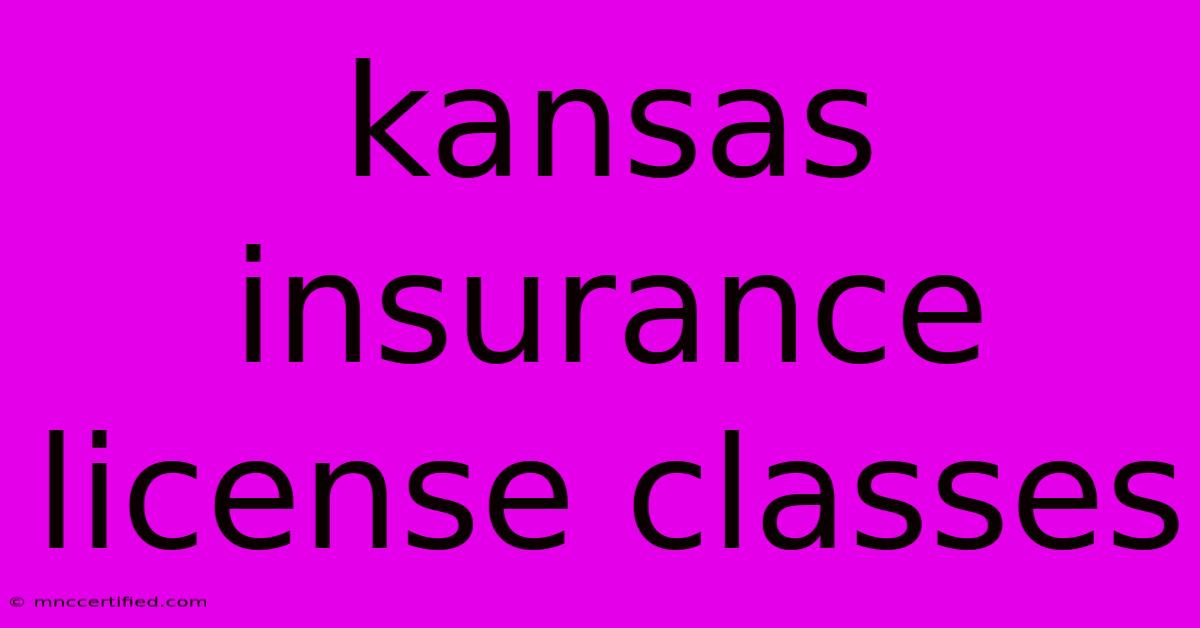Kansas Insurance License Classes

Table of Contents
Kansas Insurance License Classes: A Complete Guide
Navigating the world of insurance licensing in Kansas can feel overwhelming. Understanding the different license classes available is crucial for aspiring insurance professionals. This comprehensive guide breaks down the various Kansas insurance license classes, outlining the requirements and responsibilities for each. Whether you're aiming for a career in property and casualty, life and health, or a combination, this resource will provide the clarity you need.
Understanding the Kansas Insurance Licensing System
The Kansas Department of Insurance (KDOI) regulates insurance licensing within the state. Their licensing system categorizes insurance professionals into various classes based on the specific types of insurance they are authorized to sell. Obtaining the correct license is paramount to legally operating within the state. Failure to do so can result in significant penalties.
Key Considerations:
- Pre-licensing Education: Before applying for any Kansas insurance license, you'll need to complete a state-approved pre-licensing course. The required hours vary depending on the license class.
- Examination: Following the completion of pre-licensing education, you'll need to pass a state-administered examination.
- Application and Fees: Submitting a completed application and paying the associated fees is a necessary step in the licensing process.
- Background Check: As part of the application process, you will undergo a background check.
- Continuing Education: Maintaining your license requires completing continuing education courses annually.
Major Kansas Insurance License Classes
Kansas offers several insurance license classes, broadly categorized into Property & Casualty and Life & Health. Let's delve into the key classes:
Property & Casualty Insurance
These licenses permit the sale of insurance products protecting against property damage and liability. Common lines of coverage include:
- Auto Insurance: Covering vehicles against accidents and damage.
- Homeowners Insurance: Protecting residential properties from various risks.
- Commercial Insurance: Providing coverage for businesses and their assets.
- Umbrella Insurance: Offering supplemental liability coverage beyond primary policies.
Common License Classes (Property & Casualty):
- Property and Casualty: This is often a broader license covering several lines of insurance. Specific endorsements might be needed for certain lines of coverage.
- Personal Lines: Focusing on insurance for individuals, such as auto and homeowners.
- Commercial Lines: Concentrating on insurance for businesses and commercial properties.
Life and Health Insurance
These licenses authorize the sale of insurance products designed to protect against financial losses related to health issues or death. Common lines of coverage include:
- Life Insurance: Providing financial protection to beneficiaries upon the death of the insured.
- Health Insurance: Covering medical expenses and healthcare services.
- Disability Insurance: Offering income replacement in case of illness or injury.
- Long-Term Care Insurance: Providing coverage for long-term care expenses.
Common License Classes (Life & Health):
- Accident & Health: Focuses on health insurance products.
- Life Insurance: Specifically covers life insurance policies.
- Life, Accident & Health: A combined license allowing the sale of both life and health insurance products.
Finding the Right License for You
Choosing the appropriate license class depends on your career aspirations and areas of interest within the insurance industry. Consider the following:
- Your Interests: Are you passionate about protecting individuals or businesses? Do you prefer working with complex commercial policies or simpler personal lines?
- Career Goals: Do you envision yourself working for a large insurance firm or starting your own agency?
- Market Demand: Researching the demand for specific insurance lines in your area can guide your decision.
It's important to consult the KDOI website for the most up-to-date information on license requirements and application processes.
Maintaining Your Kansas Insurance License
Once licensed, staying compliant with KDOI regulations is crucial. This includes:
- Continuing Education: Complete the required continuing education hours annually to maintain your license.
- Reporting Changes: Notify the KDOI of any changes to your personal information or business address promptly.
- Compliance with Laws and Regulations: Stay abreast of changes in state insurance laws and regulations.
Failure to comply can lead to license suspension or revocation.
Conclusion
Obtaining a Kansas insurance license is a significant step towards a rewarding career. Understanding the different license classes and the associated requirements is critical for success. By utilizing this guide and consulting the KDOI website, you can confidently navigate the licensing process and build a fulfilling career in the Kansas insurance industry. Remember to always verify information with the official KDOI website for the most accurate and current details.

Thank you for visiting our website wich cover about Kansas Insurance License Classes. We hope the information provided has been useful to you. Feel free to contact us if you have any questions or need further assistance. See you next time and dont miss to bookmark.
Featured Posts
-
Arsenal Vs Juventus Live Womens Cl
Nov 22, 2024
-
I M A Celebs Coles Admits Past Lie
Nov 22, 2024
-
Maura Higgins Backs Coleen Rooney
Nov 22, 2024
-
Richard Coles Wealth And Earnings
Nov 22, 2024
-
Hammarby Vs Man City Womens Champions League
Nov 22, 2024